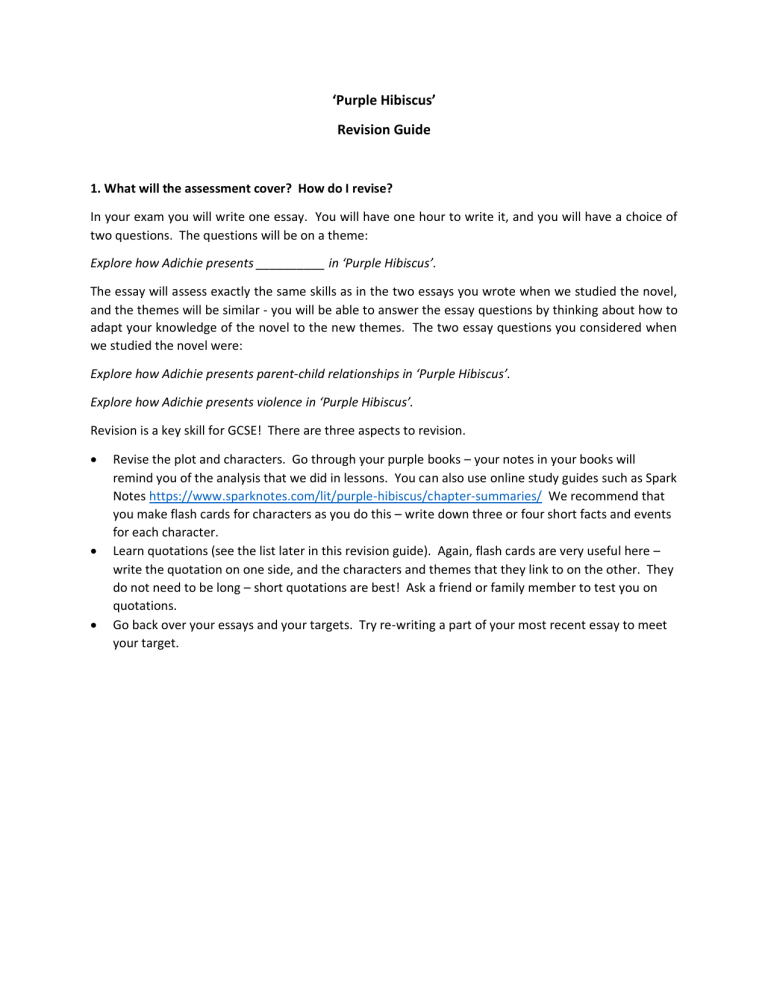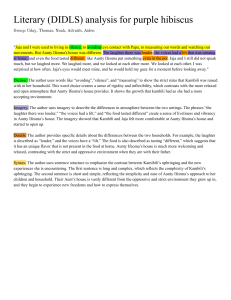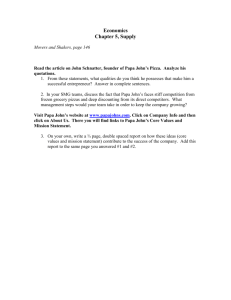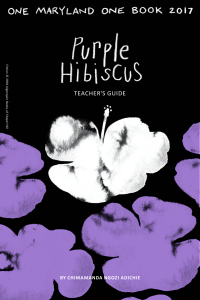
‘Purple Hibiscus’ Revision Guide 1. What will the assessment cover? How do I revise? In your exam you will write one essay. You will have one hour to write it, and you will have a choice of two questions. The questions will be on a theme: Explore how Adichie presents __________ in ‘Purple Hibiscus’. The essay will assess exactly the same skills as in the two essays you wrote when we studied the novel, and the themes will be similar - you will be able to answer the essay questions by thinking about how to adapt your knowledge of the novel to the new themes. The two essay questions you considered when we studied the novel were: Explore how Adichie presents parent-child relationships in ‘Purple Hibiscus’. Explore how Adichie presents violence in ‘Purple Hibiscus’. Revision is a key skill for GCSE! There are three aspects to revision. • • • Revise the plot and characters. Go through your purple books – your notes in your books will remind you of the analysis that we did in lessons. You can also use online study guides such as Spark Notes https://www.sparknotes.com/lit/purple-hibiscus/chapter-summaries/ We recommend that you make flash cards for characters as you do this – write down three or four short facts and events for each character. Learn quotations (see the list later in this revision guide). Again, flash cards are very useful here – write the quotation on one side, and the characters and themes that they link to on the other. They do not need to be long – short quotations are best! Ask a friend or family member to test you on quotations. Go back over your essays and your targets. Try re-writing a part of your most recent essay to meet your target. 2. Short summary of the novel. For more detailed summaries of plot and character, use this website: https://www.sparknotes.com/lit/purple-hibiscus/chapter-summaries/ Fifteen-year-old Kambili lives in luxury in Enugu, Nigeria. Kambili, her seventeen-year-old brother Jaja, and their parents—Papa and Mama—inhabit a huge house inside a walled compound. A chauffeur drives Kambili and Jaja to and from their private schools. Papa, Eugene Achike, is a wealthy and famous factory owner, newspaper publisher, philanthropist, and champion of human rights. Papa and Mama are pillars of St. Agnes church. In the privacy of his own home, however, Papa is an abusive tyrant. He demands perfection from Jaja and Kambili, plans every moment of their lives, and punishes them physically if they don’t follow his plan. Kevin, their chauffeur, takes them everywhere and reports their behavior to Papa. Papa also physically abuses Mama, who excuses and endures his abuse by taking refuge in her collection of miniature figurines of ballet dancers. A military coup topples the government, and Papa gets caught up in pro-democracy work. At about the same time, Mama discovers she is pregnant again after several miscarriages. Early in her pregnancy, on Pentecost Sunday, Mama feels ill and asks to be excused from a social obligation. Papa beats her so badly for this that she miscarries again. Kambili and Jaja watch as Papa carries Mama out of the house. Mama comes home from the hospital, and Kambili’s life resumes its strict routine. But she struggles in school and comes in second, not her usual first, on her exams. When he hears of this, Papa becomes furious, but an emergency interrupts Kambili’s punishment. The military government arrests Ade Coker, the editor of Papa’s newspaper. After arranging Ade Coker’s release, Papa turns his attention back to Kambili and reminds her that God expects perfection. As is the custom in Nigeria, the Achike family returns to their home village, Abba, for Christmas. At their country mansion in Abba, Papa receives an endless stream of villagers and bestows gifts on them, while Mama and the other women feed the visitors. Papa’s father, Papa-Nnukwu, also lives in Abba. Papa allows Kambili and Jaja to visit Papa-Nnukwu, but only for fifteen minutes because he views their grandfather as a heathen. Aunty Ifeoma, Papa’s sister, arrives in Abba with her three children: Amaka, a fifteen-year-old girl; Obiora, a slightly younger boy; and Chima, a boy of seven. Against Papa’s wishes and without his knowledge, Aunty Ifeoma takes Kambili and Jaja to a traditional festival. Even worse, she brings Papa-Nnukwu along. PapaNnukwu explains Igbo folklore to his grandchildren. Later, when Aunty Ifeoma also asks Papa to let Kambili and Jaja come with her on a pilgrimage to a Catholic shrine, Papa reluctantly agrees. Kevin drives Kambili and Jaja to visit Aunt Ifeoma in Nsukka, where she lectures at the university. Her small flat lacks luxuries they are used to. The electricity and water are unreliable. Gas and food are scarce. But laughter and music fill Aunty Ifeoma’s house. Aunty Ifeoma lets children speak their minds without fear of punishment. They listen to popular music and watch television. Jaja thrives in this new environment and takes up Aunty Ifeoma’s enthusiasm for her rare purple hibiscus and the other flowers in her colorful garden. Kambili adjusts less easily. She must learn the simplest household tasks, and her cousin, Amaka, sneers at her for being rich. Kambili acts shy and nervous. Father Amadi, a handsome young priest, tries to bring Kambili out of her shell. He encourages her to run, sing, and smile. Police once more arrest Ade Coker, so Papa asks Aunty Ifeoma to let Kambili and Jaja stay in Nsukka for a few days more. Then Papa-Nnukwu gets sick, and Aunty Ifeoma brings him to stay with her in Nsukka. While helping take care of Papa-Nnukwu, Kambili and Jaja get to know him and hear his stories. When Papa discovers that his “heathen” father is living under the same roof as his children, he travels to Aunty Ifeoma’s to take them back home. However, Papa arrives in Nsukka right after Papa-Nnukwu dies, and Papa then berates Aunty Ifeoma for not calling a priest. Back home in Enugu, Kambili and Jaja see their Mama’s swollen face and black eye. After dinner, Papa punishes them for not telling him about PapaNnukwu, and he forces Kambili to stand in boiling water. Later, Kambili and Jaja show each other their secret souvenirs from Nsukka. Kambili has a watercolor portrait of Papa-Nnukwu, painted by Amaka. Jaja has cuttings from Aunty Ifeoma’s purple hibiscus plants. They keep their secrets as the political situation worsens and Papa becomes ever more tense. Leaders of the pro-democracy movement warn Papa that he is in danger. A pipe bomb kills Ade Coker. One day, Papa discovers the portrait of Papa-Nnukwu and erupts in rage. He kicks Kambili until she falls unconscious. After Kambili gets out of the hospital, she and Jaja go back to Nsukka to stay with Aunty Ifeoma. Kambili spends more time with Father Amadi, with whom she is now in love. Mama arrives unexpectedly in a taxi. Once again, Papa has beaten her and caused her to miscarry. In spite of Aunty Ifeoma’s outrage, Mama goes back home, taking Kambili and Jaja with her. The day after Mama, Jaja, and Kambili return home is Palm Sunday. Jaja refuses to take communion at Mass. After church, Papa explodes in rage and throws a heavy liturgical book at Jaja. Instead of hitting Jaja, however, the book hits Mama’s precious figurines and shatters them into bits. From that moment on, everything changes. Papa seems to shrink as Jaja continues to defy him. Aunty Ifeoma loses her university job and applies for a visa so she can go to America. Father Amadi gets a new assignment in Germany. Papa dies suddenly. The autopsy reveals he has been poisoned. Mama tells Kambili and Jaja that she’d been feeding Papa poison, but when the police arrive, Jaja confesses to the crime. Mama spends a small fortune on lawyers and bribes to ease Jaja’s time in jail. Meanwhile, the Head of State dies, and prodemocracy groups accuse the military regime of killing Papa. Finally, after more than thirty months, Mama and Kambili learn that Jaja will be released. They begin to plan a better future. 3. Context Post-colonial fiction Chimamanda Ngozi Adichie's fiction, including Purple Hibiscus, is classified as postcolonial literature. The term postcolonial literature generally applies to literature produced in certain nations that once were colonies ruled by European countries, such as Britain and Spain. Postcolonial literature often explores the complex issues of identity and culture through the eyes of characters who exist at the soft boundaries of colonial and indigenous culture. Characters often struggle to find the right balance between these disparate elements as they forge their own identities. Nigeria was a British colony from 1914 to 1960. The means and effects of the colonial project, the anti-colonial reaction, and the blending of cultures in a postcolonial society are all prominent features of Purple Hibiscus. Adichie was influenced and inspired by an early post-colonial Nigerian text, Things Fall Apart, by Chinua Achebe (1958). The novel is set in the 1890s and chronicles the life of Okonkwo, the leader of an Igbo community, and his downfall following the arrival of white missionaries and colonial government into Igbo society. Tired of reading white men’s accounts of ‘primitive’ Africa, Achebe sought to convey a fuller understanding of one type of African culture and give voice to an underrepresented and exploited colonial subject. The opening line of Purple Hibiscus pays homage to this novel. Adichie Adichie was born and raised in Nsukka, Nigeria. Her father was a professor at the University of Nigeria and her mother was the university’s first female registrar. Adichie studied medicine at the university and then moved to the United States at age 19, where she received master’s degrees. These experiences are echoed in the characters of Aunty Ifeoma and Amaka. In addition to her fiction, Adichie has written non-fiction including a talk which was published as a text, We Should All Be Feminists, in which Adichie argues that people do a great disservice to both men and women by teaching them to adhere to strict gender roles. Adichie discusses the injustice of societal expectations for women, both in African culture and in the world at large. She suggests that in raising children, we focus more on their innate abilities and less on their gender characteristics: “What if we focus on interest instead of gender?”. Again, these issues are explored through the experiences of the female characters in Purple Hibiscus. Igbo culture The Igbo people are one of the main ethnic groups in Nigeria. Before colonization they lived in small communities, each with its own leadership, though the pressures of colonization and the Biafran Civil War served as unifying forces. Traditionally, villages were made up of compounds, which in turn were made up of several separate households. Each village was typically populated by one umunna, or patrilineal group—family relationships through the male line. The wealthy men of the village formed a council that oversaw governance of the village. Traditional Igbo religion involves worship of a variety of deities, spirits, and ancestors that can influence human affairs and provide protection. Above the other deities is a creator god, Chukwu, with a number of lesser deities below Chukwu in rank, such as an earth goddess, Ala, and the water god Idemili. Shrines honor various deities and spirits, and many contain small wooden figures representing these beings. A personal god or guardian spirit, called chi, is given to a person by Chukwu and guides that individual's destiny. Adichie presents these beliefs through the character of Papa-Nnukwu. As a result of colonisation, many Igbo converted to Christianity, as Christian missionaries set up schools teaching Christian beliefs and customs. There was initial conflict between Christian beliefs and traditional Igbo beliefs. However, over time many Igbo began to practice a combination of Christian and traditional Igbo faiths. Adichie explores this through the contrast between Papa’s very strict Catholicisim, Papa-Nnukwu’s traditional beliefs, and Aunty Ifeoma’s Catholic faith which also respects and recognizes Papa-Nnukwu’s traditional beliefs. Colonisation Nigeria is home to a number of different ethnic groups, including the Hausa-Fulani, the Yoruba, and the Igbo. In the late 19th century, the British arrived, and the long process of colonising the country by force began, despite ongoing resistance. Under British rule, European schools teaching Western culture and values spread, as did the use of English and the practice of Christianity, especially in the south. In order to help conversion, traditional religions were demonized and stamped out. This led to what is described as a "colonial mentality" - when a person prefers the culture of the colonising force, to their own native culture. This is seen in the character of Papa, who rarely speaks Igbo and constantly seeks the approval of white religious people; Aunty Ifeoma comments on his colonial mindset. After independence Colonisation was fundamentally a violent process, involving military suppression as well as cultural colonization, and this led to continued violence after independence. The British stayed in power until October 1, 1960, when the country was granted independence. Under the Nigerian constitution established at that time, the government was led by a prime minister, chosen by election. The constitution also created a ceremonial head of state position. However, tensions between ethnic groups caused continuing problems, which eventually led to a coup in January 1966. During the coup, Prime Minister Balewa was murdered, and a military regime was established under Major General Johnson Aguiyi-Ironsi. A predominantly Igbo region declared itself the independent Republic of Biafra, and civil war soon followed. The conflict, known as the Biafran Civil War, lasted until January 1970, when the Biafran forces surrendered. Attempts to reconcile the warring groups and return the country to civilian rule were mostly unsuccessful, and coups and assassinations continued. In November 1993 General Sani Abacha took power in another coup; he was a brutal ruler whose administration violently suppressed critics. Abacha was eventually arrested and imprisoned; he died in jail in June 1998 and was replaced by General Abdulsalam Abubakar. Abubakar was less authoritarian, and his promise to return the country to civilian rule was more sincere. Political prisoners were freed, and critics of the government were given more latitude. In 1999 the country was finally returned to civilian rule under president Olusegun Obasanjo. Purple Hibiscus is set in the 1980s or 1990s. Although there is no one-to-one correspondence between the story's characters and events to real people and events, certainly events from the time inform the novel. In Section 2 a coup takes place, and Papa sadly notes that coups beget coups in a vicious cycle. He tells his children about the "bloody coups of the sixties, which ended up in civil war." Like many of the coups during these decades, and particularly reminiscent of Abacha's rise to power, the new government begins with promises of peace and then shows itself to be just as violent and corrupt as the previous one. The character of Ade Coker, the journalist killed by a package bomb delivered to his home, is likely based on Dele Giwa (1947–86), cofounder of the Nigerian publication Newswatch, who was killed by a package bomb stamped with the Nigerian coat of arms and marked with the words "from the Commander-in-Chief." Nwankiti Ogechi, the prodemocracy activist featured in the novel, is likely based on Ken Saro-Wiwa (1941–95), an activist arrested and executed for treason. In the novel, Amaka also listens to the music of Fela Kuti: he was a real person, a musician and political activist who rose to fame in the 1970s and was imprisoned by the military junta for being an outspoken critic. He continued to record and perform throughout the 1980s and 1990s until his death in 1997. 4. Quotations Themes National Violence Papa says: A coup always began a vicious cycle. Military men would always overthrow one another, because they could, because they were all power drunk. Only the Standard had a critical editorial Kambili describes the market: I saw a soldier raise a whip in the air Personal violence Papa flung his heavy missal and broke the figurines A love sip he called it … always burned my tongue Papa said we would recite sixteen different novenas. For Mama’s forgiveness. I did not even think to think what Mama needed to be forgiven for. He swung his belt at Mama, Jaja and me, muttering that the devil would not win. “Why do you walk into sin?” “Did the belt hurt you?” It was like the hot water that Papa had poured on my feet, only this time it was my entire body that burned. The old silence had broken and left us with the sharp pieces. Colonialism and religion Said by an old man at Abba, to Papa: “You are like a fly blindly following a corpse into the grave!” “Papa-Nnukwu is not a pagan, Kambili, he is a traditionalist” “I should not have let him follow those missionaries” Aunty Ifeoma, about the mmuo: “Don’t look, girls. Let’s humour your grandfather.” “Eugene has to stop doing God’s job” Defiance Things started to fall apart at home when Jaja did not go to communion Jaja’s defiance seemed to me like Aunty Ifeoma’s experimental purple hibiscus … A freedom to be, to do You were just singing along with Fela Silence hangs over us, but ... a different kind of silence, one that lets me breathe. Being defiant can be a good thing sometimes. When a house is on fire, you run out before the roof collapses on your head. Characters Kambili I did not own any trousers because it was sinful for a woman to wear trousers I wondered how Amaka did it, how she opened her mouth and had words flow easily out I was not sure what my laughter sounded like. Jaja We did that often, asking each other questions whose answers we already knew. “I told your mother you would take after Jaja of Opobo … Jaja the stubborn king.” Jaja’s eyes shone as he talked about the hibiscuses “She will never heal,” Jaja said. Those shoulders that bloomed in Nsukka, that grew wide and capable, have sagged in the 31 months that he has been here. Mama I used to wonder why she polished them [the figurines] each time I heard the sounds from their room She spoke the way a bird eats, in small amounts Papa Then [Papa] reached out and held my hand and I felt as though my mouth were full of melting sugar People waved and called out Papa’s title, Omelora I knew that when the tea burned my tongue, it burned Papa’s love into me. He was gracious, in the eager-to-please way that he always assumed with the ... white religious. Ade Coker They put out cigarettes on his back. Ade Coker was a small, round, laughing man “They are always so quiet” ... “Imagine what the Standard would be if we were all quiet.” Papa-Nnukwu His eyes twinkled with mischief The compound was barely a quarter of the size of our backyard in Enugu His speech had none of the anglicized inflections that ours had “Chineke! Bless the children of my children. Bless my son, Eugene, lift the curse they have put on him.” The painting ... represented something lost, something I had never had, would never have. Grandfather He determinedly spoke English, always, with a heavy Igbo accent Papa still talked about him often, as if Grandfather were his own father He was one of the few who welcomed the missionaries Aunty Ifeoma Her laughter floated upstairs … I would know that cackling, hearty sound anywhere It was what Aunty Ifeoma did for my cousins, setting higher and higher jumps for them … she did it all the time, believing that they would scale the rod. Amaka Eyes that asked many questions and did not accept many answers They all laughed alike: throaty, cackling sounds pushed out with enthusiasm 5. Model essay paragraphs with annotations Example of solid / sound paragraph Adichie shows that Papa's relationship with his children is controlling and violent. For example, Kambili and Jaja are made to follow strict schedules. ‘He revised them often. When we were in school we had less siesta time and more study time, even on weekends.’ This suggests that Papa controls Kambili and Jaja by organising their lives, and that he believes that it is more important that they should be working hard and have little time for relaxing or being themselves. This is developed when Adichie shows Kambili with her cousins. She wants to join their laughter ‘but we were driving past our house and the sight of the looming black gates stiffened my lips.’ Arguably, the walls and gates of Kambili's home in Abba symbolise the way Kambili is contained and restricted. This suggests that Papa controls Kambili so much that she cannot relax and laugh even when she is away from him. Ultimately, Adiche shows that Papa turns to violence to keep control, ‘he swung his belt at Mama, Jaja and me, muttering that the devil would not win’. It could be argued that Papa turns to violence when he loses control of Kambili and Jaja, when they do something he perceives to be sinful. Adichie uses the relationship between Papa and his children to show how damaging his violent behaviour is, but also to suggest that his extreme behaviour will eventually lead his children to defy him. However, Adichie also suggests that Papa’s behaviour is a result of his own restricted upbringing, where he was educated by missionaries who punished him by plunging his hands into boiling water. Missionary schools were a common feature of colonization and a way of imposing colonial values and power. The way Papa adopts the same methods of punishment with his children suggests that he has adopted the colonial mindset, believing that colonial ways are superior to Igbo traditions. Examples with embedded quotations Interpretation / explanation of examples Adichie’s intentions Context Link between text and context Sample from full-mark student essay Furthermore, Adichie portrays the relationship between Aunty Ifeoma and her children as enabling and nurturing, along with becoming a mother figure to Jaja and Kambili, caring for them and inspiring them to be freer and have confidence. Aunty Ifeoma is written as a character who is very easy-going and enabling, always trying to do what is best for Amaka, Obiora and Chima. She allows for her children to laugh in events such as dinner, which is a contrast to the silent meals with Kambili’s family. Amaka can challenge Father Amadi’s religious beliefs without facing a harsh punishment for expressing her faiths, emphasising that Ifeoma has brought up her children in a way where they are not disrespectful, but can also think for themselves. Adichie reinforces the idea that there is constant laughter in Aunty Ifeoma’s house, showing the nurturing and joyful relationship her and her children have, “Laughter rang throughout Aunty Ifeoma’s house … Arguments rose and fell just as quickly.” Adichie deliberately shows the clear differences between the two families to highlight Aunty Ifeoma’s admirable attitudes and behaviours towards her children where they do not face violence, and instead telling them to watch what they say, “Amaka? I do not like that tone!” in comparison to Papa who would punish Kambili and Jaja for the slightest things, for example if they were to challenge a priest's religious views just as Amaka does. This is developed further when Kambili is in hospital after being beaten by Papa. Kambili begs “Mama, call Aunty Ifeoma, call Aunty Ifeoma please.” This effectively demonstrates how Ifeoma is starting to become a mother figure to Kambili and Jaja, as Kambili would preferably want to be with her and hear voice instead of her own Mother’s. Adichie is effective in showing Kambili’s feelings to Aunty Ifeoma and her adoration instead of wanting to be with Mama when she states, “I wish I could get up and hug her and yet I wanted to push her away, to shove her so hard that she would topple over the chair.” Along with Kambili, Adichie shows how Aunty Ifeoma is additionally a good influence on Jaja. She helps Jaja to realise more about his worth and becoming defiant like ‘Jaja of Opobo’ who he is nicknamed after and was a defiant leader who did not follow along with the rules. Unlike Mama, Aunty Ifeoma challenges Jaja and lets him do the things he loves. This is shown when Aunty Ifeoma first introduces him to the “Purple Hibiscuses” in the garden, which throughout the novel is a motif for defiance, the main theme Jaja is linked to. Purple Hibiscuses are not considered ‘normal’ as they are an interbred plant, this too implies Jaja’s “bloom” of defiance. As well as helping to grow them in Nsukka with Aunty Ifeoma, he grows them in secret back at their home in Enugu, symbolising how much he has changed because of Ifeoma. “‘See the Purple Hibiscuses are about to bloom.’” This creates an idea that Jaja is alike to the flower, and his defiance is about to bloom, referencing the disaster that is caused later at Palm Sunday by his defiance. Aunty Ifeoma is a very personal character to Adichie to their many similarities. Adichie was born in Nsukka, and it is the same with Aunty Ifeoma who lives there, she shares the same views about being open and respectful to another's religions and beliefs whilst keeping her own faith and being a Roman Catholic. Adichie went to university and moved to America, which is a resemblance to Ifeoma, and both have feminist views, not agreeing with the amount of sexism and misogyny the government influences. 6. Sentence stems and style guide Always use ‘ ‘ for the book title, and capital letters: ‘Purple Hibiscus’ not purple hibiscus. Always use capital letters for characters’ names and place names!! Use critical vocabulary: Introduction In ‘Purple Hibiscus’, Adichie explores … [her overall message]. She portrays [question word] as … However, she also shows ... Paragraph Adichie shows / uses / explores [key word] through … For example, … This suggests that … This is developed when … This is important because … Furthermore, Adichie shows … Arguably, this symbolises / represents / shows … This is significant because it reflects [context – say what the context is and how it links to the novel] Therefore, Adichie suggests [link back to your point and Adichie’s intentions]. Conclusion In conclusion, Adichie uses [question word] in the novel to make the reader question / consider... She suggests that …, most powerfully through the character of ...



